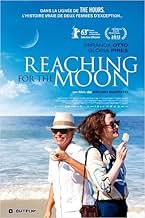IMDb रेटिंग
7.0/10
3.7 हज़ार
आपकी रेटिंग
अपनी भाषा में प्लॉट जोड़ेंA chronicle of the tragic love affair between American poet Elizabeth Bishop and Brazilian architect Lota de Macedo Soares.A chronicle of the tragic love affair between American poet Elizabeth Bishop and Brazilian architect Lota de Macedo Soares.A chronicle of the tragic love affair between American poet Elizabeth Bishop and Brazilian architect Lota de Macedo Soares.
- पुरस्कार
- 9 जीत और कुल 21 नामांकन
फ़ीचर्ड समीक्षाएं
Reaching for the Moon is the kind of movie everyone hopes for but no one makes: a gay romance where "gay romance" is not the premise. Director Bruno Barreto focuses instead on how Elizabeth Bishop and Lota de Macedo Soares challenged and changed the world and each other in other ways, and that was absolutely the right choice - these women and their story are fascinating and make for top class entertainment.
And it is entertaining. Considering the characters' issues and the story's ending it could have been drab, but the film is always lively and engaging. It flies by. Bishop takes herself very seriously, but Barreto maintains a sense of humor about it and makes fun of her just enough to keep her melodrama under control. An added bonus is that Miranda Otto gets to show off her underrated and underused comedic chops; one particular drunk scene is priceless. Glória Pires is dynamic and fiery as Lota but Otto is the real star, channeling Greta Garbo and Deborah Kerr in a gracefully commanding performance. She doesn't shy away from Bishop's spikiness, but her screen presence is so compelling that as much as we might be frustrated with her character, we can't take our eyes off her. Thanks to her constantly surprising performance, an eclectic ensemble cast, breathtaking visuals, and assured direction, Reaching for the Moon pulses with energy and is a breath of fresh air in an era of stuffy and bland biopics.
Highlights: Shots of Rio de Janeiro that belong on postcards; a performance from Miranda Otto that would have won an Oscar in 1937; the assertion that some things are more important than whether a person is gay
Verdict: Watch this with your parents instead of Blue Is the Warmest Color
And it is entertaining. Considering the characters' issues and the story's ending it could have been drab, but the film is always lively and engaging. It flies by. Bishop takes herself very seriously, but Barreto maintains a sense of humor about it and makes fun of her just enough to keep her melodrama under control. An added bonus is that Miranda Otto gets to show off her underrated and underused comedic chops; one particular drunk scene is priceless. Glória Pires is dynamic and fiery as Lota but Otto is the real star, channeling Greta Garbo and Deborah Kerr in a gracefully commanding performance. She doesn't shy away from Bishop's spikiness, but her screen presence is so compelling that as much as we might be frustrated with her character, we can't take our eyes off her. Thanks to her constantly surprising performance, an eclectic ensemble cast, breathtaking visuals, and assured direction, Reaching for the Moon pulses with energy and is a breath of fresh air in an era of stuffy and bland biopics.
Highlights: Shots of Rio de Janeiro that belong on postcards; a performance from Miranda Otto that would have won an Oscar in 1937; the assertion that some things are more important than whether a person is gay
Verdict: Watch this with your parents instead of Blue Is the Warmest Color
The Brazilian movie Flores Raras was shown in the United States with the title Reaching for the Moon (2013). It was directed by Bruno Barreto.
The film is based on the life of the great American poet, Elizabeth Bishop (Miranda Otto). As the movie begins, Elizabeth is traveling in Brazil, and visits the estate of the famous architect Lota de Macedo Soares, played by Glória Pires. Lota is in a lesbian relationship with Bishop's college friend Mary (Tracy Middendorf).
Despite Elizabeth's somewhat proper and restricted outlook, she accepts the love offered by Lota, even though this leaves Mary as the odd woman out. This act struck me as a shabby betrayal of an old friend, but, in the movie, it's treated as true love that makes such betrayal acceptable, if not inevitable.
It doesn't hurt that Lota has an enormous estate, and enormous resources. As an architect, Lota is able to envision and then design a beautiful writer's studio for Elizabeth.
The strong point of the movie is that it presents the writing of poetry as work. Elizabeth doesn't just close her eyes and wait until the poetic muse strikes her. She sits in the studio and pushes and pulls her poetry into shape. She's also not happy when she's interrupted during the creative process. This is the only film I can remember where creating a poem is shown as a process, and a delicate and difficult process at that.
This idyllic existence is disrupted by Brazilian political events, into which Lota plunges. The remainder of the movie is devoted to how these events play out in the lives of Elizabeth and Lota.
I don't know enough about the details of the coup, or of the lives of the film's principals, to know how accurately the film portrays them. This aspect of the movie is highly melodramatic, but the actual events were probably equally melodramatic. Certainly, the film holds your interest as the situation plays itself out to the end.
We saw this movie on the large screen, where it will work better, especially in the scenes set on Lota's estate. However, it will work well enough on the small screen. It's not a great movie, but it's certainly good enough to repay you for finding and watching it.
The film is based on the life of the great American poet, Elizabeth Bishop (Miranda Otto). As the movie begins, Elizabeth is traveling in Brazil, and visits the estate of the famous architect Lota de Macedo Soares, played by Glória Pires. Lota is in a lesbian relationship with Bishop's college friend Mary (Tracy Middendorf).
Despite Elizabeth's somewhat proper and restricted outlook, she accepts the love offered by Lota, even though this leaves Mary as the odd woman out. This act struck me as a shabby betrayal of an old friend, but, in the movie, it's treated as true love that makes such betrayal acceptable, if not inevitable.
It doesn't hurt that Lota has an enormous estate, and enormous resources. As an architect, Lota is able to envision and then design a beautiful writer's studio for Elizabeth.
The strong point of the movie is that it presents the writing of poetry as work. Elizabeth doesn't just close her eyes and wait until the poetic muse strikes her. She sits in the studio and pushes and pulls her poetry into shape. She's also not happy when she's interrupted during the creative process. This is the only film I can remember where creating a poem is shown as a process, and a delicate and difficult process at that.
This idyllic existence is disrupted by Brazilian political events, into which Lota plunges. The remainder of the movie is devoted to how these events play out in the lives of Elizabeth and Lota.
I don't know enough about the details of the coup, or of the lives of the film's principals, to know how accurately the film portrays them. This aspect of the movie is highly melodramatic, but the actual events were probably equally melodramatic. Certainly, the film holds your interest as the situation plays itself out to the end.
We saw this movie on the large screen, where it will work better, especially in the scenes set on Lota's estate. However, it will work well enough on the small screen. It's not a great movie, but it's certainly good enough to repay you for finding and watching it.
Overall had a very good impression of the movie. I think it balanced well certain aspects... especially in the portrayal of their romance. They avoided being overly prudish and that made the romance seem more real. Without getting too kinky and losing focus. The contrast between the two characters is really interesting.
The actress Gloria Pires who portrays Lota de Macedo Soares has worked in dozens of soap operas and that sometimes comes through in her films, but not this time thankfully. She so embodies the force of nature that was Lota and this comes through the screen very well. I felt like I was seeing a member of my old Rio family... so her amazing portrayal was certainly the highlight of the film for me.
PS: Being a Macedo Soares myself (but too young to have known Lota)... there might be a bit of bias in my review.
The actress Gloria Pires who portrays Lota de Macedo Soares has worked in dozens of soap operas and that sometimes comes through in her films, but not this time thankfully. She so embodies the force of nature that was Lota and this comes through the screen very well. I felt like I was seeing a member of my old Rio family... so her amazing portrayal was certainly the highlight of the film for me.
PS: Being a Macedo Soares myself (but too young to have known Lota)... there might be a bit of bias in my review.
I enjoyed this story of a lengthy midlife love affair, "based on" (that is, "not cemented to the known facts of") real women of some mid-century renown. One, American poet Elizabeth Bishop, is quiet, slow to warm to strangers or share working drafts of her poems. See if Miranda Otto doesn't remind you of Deborah Kerr in her memorable 1940s and '50s roles (and clothes). In Brazil to visit an old college friend, Elizabeth meets Lota de Macedo Soares, a charismatic commander of attention and glamorously trousered architect. They become lovers and make their life in Brazil. All the characters, including a close male friend of Lota's and one of Elizabeth's, are revelations in the best sense: mature but unfinished adults, they meet their circumstances over nearly 20 years in ways not even they might be able to predict. Mark Twain said that fiction is obliged to meet our expectations but the truth isn't. Central Casting can provide "types," but history offers people like nobody else, which is why you'll find discussions here and elsewhere complaining that these lesbians were not put through their proper lesbian plot paces! The drunks were sometimes sober! People got depressed without enough foreshadowing! Ignore all that. This is a good quiet story, mostly but not all sad, about people learning themselves as they go, living genuinely if not always bravely.
And anyone who's ever dreamed of having a writer's sanctuary will fall rapturously in love with the al fresco study Lota builds for Elizabeth. Must be seen to be appreciated!
And anyone who's ever dreamed of having a writer's sanctuary will fall rapturously in love with the al fresco study Lota builds for Elizabeth. Must be seen to be appreciated!
Glória Pires, as Lota de Macedo Soares, dominates this film to such a degree, we wonder why it's focus is the poet Elizabeth Bishop, brittlely acted by Miranda Otto. I suppose you could argue, "That's how it was both in life and their relationship," but as a viewer, our interest begs to know more about Soares.
This is a beautiful film about very talented, privileged people. An icey, supposedly repressed Bishop finds herself in the hot house of the Brazilian estate of Soares. Their torrid relationship is the subject of the film. We forget how dangerous same sex relationships were at the time, and film doesn't try to recreate that peril. And that makes some of the dynamics that plague the relationship a question. Why is Bishop able to sail above disastrous break-up; why is Soares destroyed.
What is fascinating is the liberation that the Soares estate, Petrópolis, provides. It's an Eden-like setting where the relationship flourishes. But we want more than "extraordinary people" have the same challenges in relationships as we, the ordinary. When Pulitzer Prises or major architectural commissions are awarded, the changes in dymanics that it brings aren't really explored. And I think these extraordinaryly talented people deserve a deeper, perhaps darker, film given the times they lived in and pressures it brought.
This is a beautiful film about very talented, privileged people. An icey, supposedly repressed Bishop finds herself in the hot house of the Brazilian estate of Soares. Their torrid relationship is the subject of the film. We forget how dangerous same sex relationships were at the time, and film doesn't try to recreate that peril. And that makes some of the dynamics that plague the relationship a question. Why is Bishop able to sail above disastrous break-up; why is Soares destroyed.
What is fascinating is the liberation that the Soares estate, Petrópolis, provides. It's an Eden-like setting where the relationship flourishes. But we want more than "extraordinary people" have the same challenges in relationships as we, the ordinary. When Pulitzer Prises or major architectural commissions are awarded, the changes in dymanics that it brings aren't really explored. And I think these extraordinaryly talented people deserve a deeper, perhaps darker, film given the times they lived in and pressures it brought.
क्या आपको पता है
- ट्रिवियाFour paragraphs appear between the end of the film and the beginning of the credits.
1. "Few women write major poetry. Only four stand with our best men: Emily Dickinson, Marianne Moore, Elizabeth Bishop and Sylvia Plath." - Robert Lowell
2. "I'd rather be called the 'The 16th Poet' with no reference to my sex, than one of 4 women - even if the other three are pretty good." - Elizabeth Bishop
3. Elizabeth Bishop died in 1979 in the United States. She is considered on the most important poets of the English language.
4. In 2012, UNESCO declared the city of Rio De Janeiro a World Heritage site. The Flamengo Park is one of its main attractions.
- गूफ़Opening in 1951 but Bobby Vinton singing Blue Velvet was not until 1963.
- भाव
Elizabeth Bishop: It's OK. I'm not drunk. I'm just crying in English.
- क्रेज़ी क्रेडिटNine of the main performers (the first 10) are listed in the credits without the name of their character. Only Treat Williams is credited as his character, Robert Lowell.
- कनेक्शनReferenced in Programa do Jô: 26 अगस्त 2013 को प्रसारित एपिसोड (2013)
टॉप पसंद
रेटिंग देने के लिए साइन-इन करें और वैयक्तिकृत सुझावों के लिए वॉचलिस्ट करें
- How long is Reaching for the Moon?Alexa द्वारा संचालित
विवरण
- रिलीज़ की तारीख़
- कंट्री ऑफ़ ओरिजिन
- आधिकारिक साइटें
- भाषाएं
- इस रूप में भी जाना जाता है
- Reaching for the Moon
- फ़िल्माने की जगहें
- उत्पादन कंपनियां
- IMDbPro पर और कंपनी क्रेडिट देखें
बॉक्स ऑफ़िस
- US और कनाडा में सकल
- $45,502
- US और कनाडा में पहले सप्ताह में कुल कमाई
- $14,573
- 10 नव॰ 2013
- दुनिया भर में सकल
- $15,34,391
- चलने की अवधि1 घंटा 58 मिनट
- रंग
- पक्ष अनुपात
- 1.85 : 1
इस पेज में योगदान दें
किसी बदलाव का सुझाव दें या अनुपलब्ध कॉन्टेंट जोड़ें



























